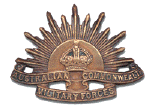 |
|
|||
|
|
||||
|
Attacks on the Australian mainland in WW2 |
|
Japanese attack on Sydney Harbour May 31 - June 1 1942
On the 23rd May a float plane was launched from I-29 and made a successful reconnaissance flight down the Harbour which confirmed large number of Allied shipping in the Harbour. A second float plane was launched at 3.45am on 30 May and was detected but thought to have been from an American cruiser. This float plane actually crashed on landing but the crew was rescued and able to confirm that sufficient targets remained to allow the mission to continue. Between 5.20 and 5.40pm the three midget subs were released eleven kilometres east of Sydney and proceeded towards the Heads. Midget 14 became entangled in the submarine netting and was detected at 9.30pm. Before any attack could be made the crew detonated demolition charges and destroyed themselves and the submarine. Midget A was the second submarine to enter the harbour. She avoided the boom nets and slowly made her way up the harbour. She was spotted at Potts Point and fired upon by the USS Chicago and HMAS Geelong. From these attacks she received no damage. Midget 21 entered the harbour at 11pm and was spotted by harbour defence craft and attacked by HMAS Yandra with depth charges. While Midget 21 was diverting attention, Midget A prepared to make an attack on the fully illuminated USS Chicago. The floodlights were finally turned of at Garden Island at 12.25am, just minutes before Midget A fired. Both torpedoes missed the Chicago, one running aground on Garden Island and failing to explode, while the other passed under the Dutch Submarine K-9 and exploded beside the Depot Ship Kuttabul when it hit the sea wall. The Kuttabul sank with the loss of 19 Australian and 2 British naval ratings. 10 others were wounded in the attack. Midget A then proceeded up the harbour to escape but failed to meet up with the mother ship. It is presumed to have sunk somewhere either in the harbour or just outside. Meanwhile Midget 21, having survived HMAS Yandra's attack proceeded up the harbour. She was spotted several times before HMAS Sea Mist located her and attacked with a depth charge attack which continued until 8.27am when she was spotted on the bottom in a stationary position with her engines running. Divers later that morning discovered the crew had shot themselves rather than surrendering. Japanese attack on
Newcastle On the 8th June 1942, the Japanese submarine I-21 bombarded Newcastle for almost 20 minutes. The attack commenced at 2.15am and a total of 34 shells were fired from a position at sea of 9,000 meters. Most of these shells landed near the power station and customs house and although all but one shell failed to explode, some damage was caused to buildings and houses. The attack finished a few minutes after the guns at Fort Scratchley fired four rounds in reply. There were no recorded casualties.
Japanese air raid on
Townsville In July 1942, three raids were made against Townsville by Japanese flying boats stationed at Rabaul. At this time Townsville was the most important air base in Australia. On the night of 25-26 July 1942, three Japanese flying boats dropped bombs into the harbour but caused no actual damage. They returned on the nights of 27-28 and 28-29 July again dropping bombs without causing any damage. Both times American Airocobras attempted to intercept the invading planes without success. A final raid was undertaken on the 30th when a single bomb was dropped near Cairns.
Two weeks after the attack on Darwin, Broome suffered Australia's second worst air raid on 3 March when 70 people were killed and 24 aircraft including 16 flying boats were destroyed. Simultaneous to the raid on Broome, eight Japanese fighters hit Wyndham. Broome was again hit on 20 March, the same day that Derby suffered its only raid. Horn Island was hit on 14 March and additional raids against Horn Island met no air resistance but ceased in August 1942. In late July 1942, three raids were made against Townsville which was by then the most important air base in Australia. Three Kawanishi flying boats dropped bombs on the harbour on the night of 25–26 July and lone flying boats returned on the nights of 27–28 and 28–29 July. A final raid took place on the Australian east coast on the night of 30 July when a single bomb was dropped near a house at Cairns. Air Raids on Australian Mainland - from AWM 54 Item 812/3/12 |
|||||||||||||||||||||||||||||||||||||||||||||||||||||||||||||||||

